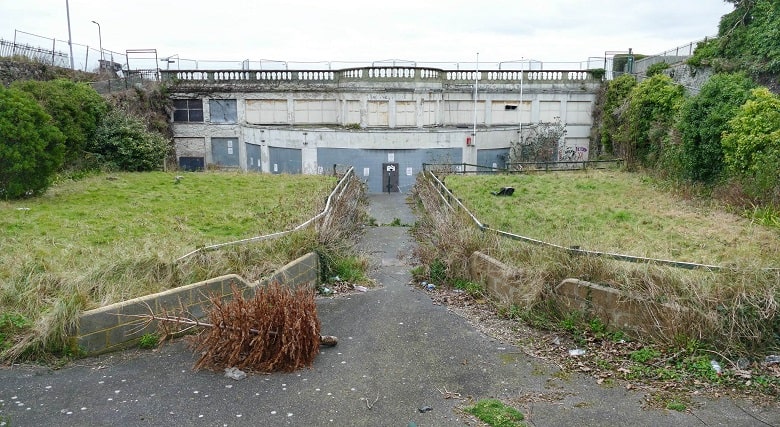
A company set up by the owner of Ramsgate’s West Cliff Hall filed to be struck off and dissolved last month.
The compulsory strike off action was discontinued the following day (January 11) for the company which has been dormant since it was created in 2019.
Westcliff Development Ltd is headed up by Dr Davinder Singh Jamus and Mohinder Singh Rajan, who bought West Cliff Hall for £225,000 in 2018 after Thanet council put it to auction.
No planning applications have been submitted to the council since the purchase.
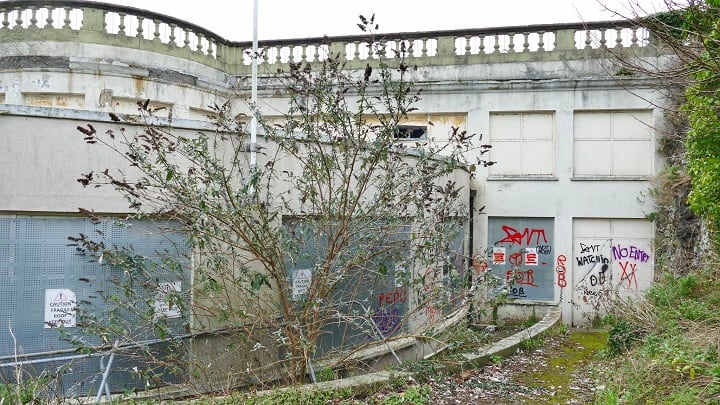
The hall, at The Paragon, has been empty since 2005 when the Motor Museum left the site. Over the following almost two decades the property has remained empty and continued to deteriorate.
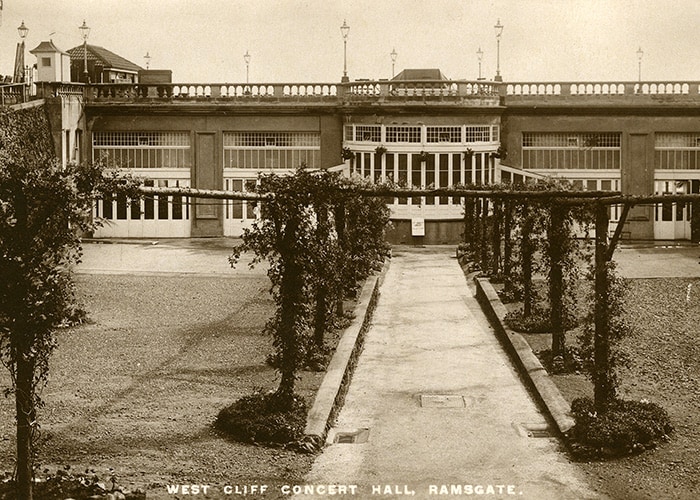
It opened in 1914 as a theatre, concert hall and promenade venue, adjacent to the Royal Paragon Baths.
It had been an Italian Garden with bandstand until the cliff was dug out to make space for the new hall. The first 40 metres of the existing promenade along Ramsgate’s West Cliff, are formed by the roof of the concert hall which previously hosted acts including the Rolling Stones in 1964.
Plans to rebuild and recreate the site were put in motion by youth charity Project MotorHouse in 2009.
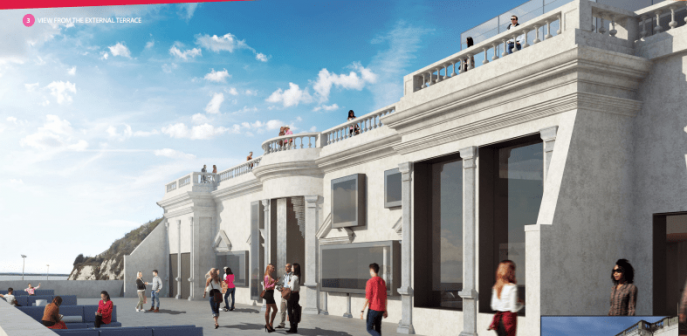
The charity, which was headed by Ramsgate resident Janet Fielding before a decision to shut it down last year, wanted to create cinemas; theatres; bars; restaurants, offices and youth facilities.
The site had been on the council’s disposal list from 2005 to 2010 without any other interest being expressed.
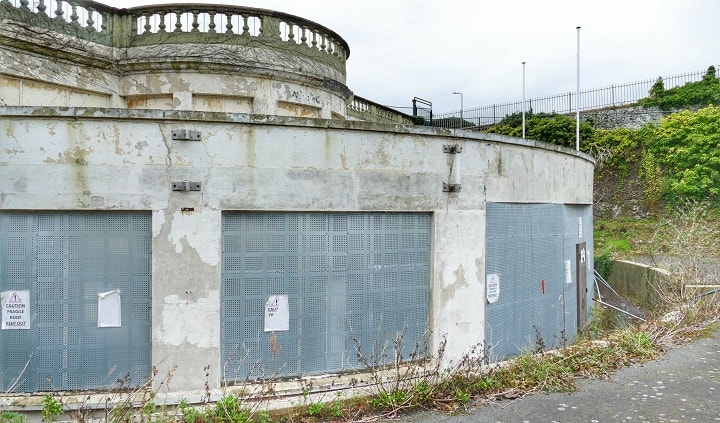
In 2014 Thanet council and Project MotorHouse jointly commissioned a surveyor’s report which found that not only was the steel frame of the building severely corroded and needed replacing, but the outer walls were resting on wet masonry with no other support.
A structural survey, which was carried out by Holt and Wotton Ltd, said the toilet block of the hall “in part supports the adopted highway,” adding “some propping has been provided within the building.
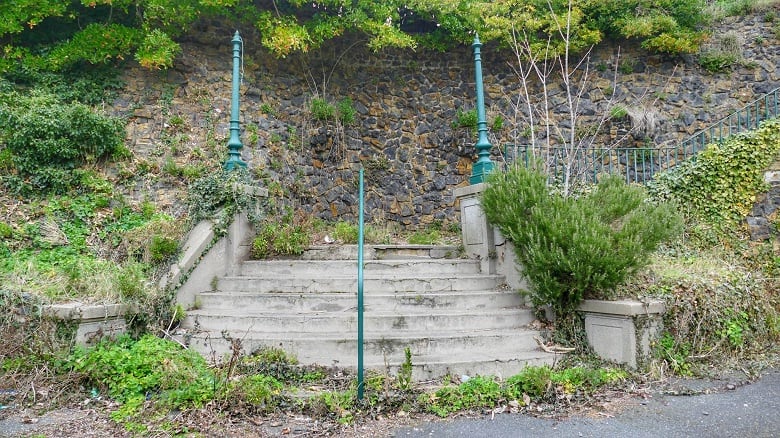
“The propping in the two-storey section is due to serious deterioration of precast concrete roof beams and the section of the promenade over this area of the building has been fenced off to prevent public access.
“The propping in the stairwell is due to the heavily corroded condition of the steel beams within the stairwell.”
The report outlined corrosion and cracks throughout the hall and added: “There are many issues with this building.
“In simple terms the exposed steel work in the stairwell between the building and the toilet block and at the rear of the stairwell at low level are all severely corroded such that they would need replacement.”
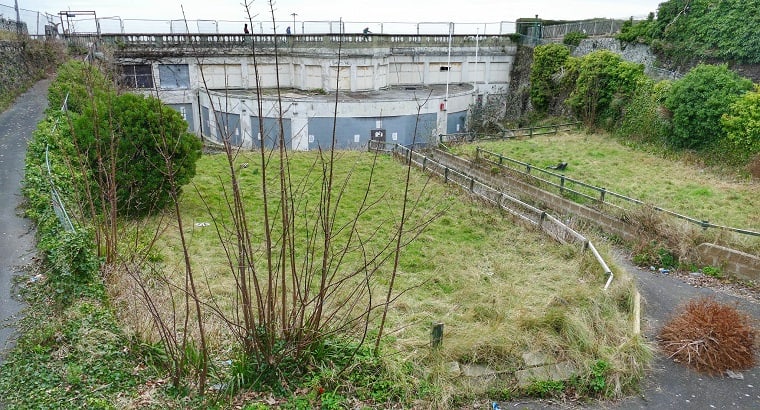
The survey said the asphalt roof had reached the end of its life. In looking at options for the future of the building the report said retaining it would mean ‘significant repair,’ and a new build would be “easier to achieve long term solutions.”
A third option, to infill the site, was deemed too expensive. A suggestion was to demolish the main building and construct an embankment.
MotorHouse raised more than £300,000 which paid for lawyers, asbestos removal and propping, fixing the garden walls, vat specialists, surveys, a construction industry project manager and designs by architect Guy Hollaway.
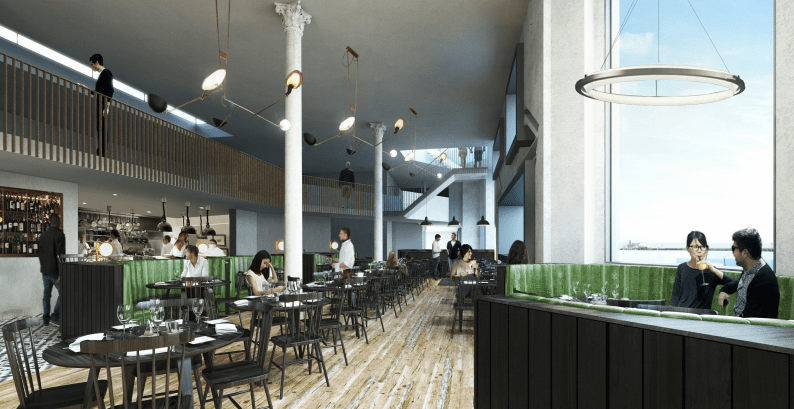
But in 2017 Thanet council approved the sale of the West Cliff Hall, and the Western Undercliffe café and toilets, on the open market.
It was bought at auction the following year for £225,000. Since then no work has taken place at the site.
At the time of the sale concerns were raised over possible landbanking.
Thanet council says the building is privately owned with no planning applications showing as having been submitted in the last five years.
West Cliff Hall – a timeline
July 1914 – The West Cliff Hall and Gardens opens to the public as a concert hall on the site of the Italian Gardens. On a sunny day, the concerts were held outdoors in the sunken gardens.
1914 – 1918 – Despite repeated bombardment from Europe and the nearby placement of a Maxim gun, the West Cliff Hall survives.
1920s – The hall is a popular concert venue with townsfolk and visitors alike.
1930s – The building is extended thus widening the Promenade. A one storey extension is also added. It ruins the elegant Edwardian lines of the original building.
1940s – During the World War II, dances are held in the hall for the pilots based at Manston Airport.
1950s – The old Victorian baths next to the West Cliff collapsed down onto what is now the port. It was only the quick thinking of a local woman that there was no loss of life. She noticed the road cracking and stopped all traffic.
1964 – The number of local people who saw the Rolling Stones play at West Cliff Hall could fill the building many times over.
1970s – The original seafront terrace was extended to its current size which is approximately 600 square metres.
1980s – Two brothers from Essex take over the lease and turn it into a Motor Museum.
2005 – The Motor Museum closes.
May 2009 – Janet Fielding first approaches Thanet District Council (TDC), theowner of the building
August 2009 – Ramsgate Arts conducts Love, Hate, Hope: Ramsgate – a community consultation that attracts 900 people over three days and identifies derelict buildings plus a poor ‘cultural’ offering as significant problems.
February 2010 – The Theatres Trust, which is a statutory body, writes to TDC’s then Chief Executive stating that any planned development of the site building needs to include a theatre.
July 2010 – Following a year of consultation and research, Low Carbon Community Ramsgate (Later Project MotorHouse) presents its first draft business plan to Thanet District Council and it makes the case for the building being self-supporting. The local residents help reclaim the gardens.
November 2010 – Thanet District Council and Project MotorHouse set out a Heads of Agreement. The negotiations will drag on for three long years.
July 2011 – Project MotorHouse is incorporated as Low Carbon Community Ramsgate but changes its name a month later following work with a focus group of local youths.
August 2011 – Funded by Ramsgate Town Council and Kent County Council, Project MotorHouse conducts a community consultation during Ramsgate Arts’ Summer Squall Festival. PMH plans for the site get overwhelming endorsement.
September 2011 – TDC Cabinet agree the asset disposal to PMH using an option method proposed by Project MotorHouse.
October 2011 – Locality begin to provide specialist legal advice and negotiations with TDC on the detail of the Option and Transfer Deed.
March 2012 – Both Ramsgate Town Council and Kent County Councillors award PMH funds towards doing minor works including securing the site from intruders.
January 2013 – Dr Who Fund Raising event with David Tennant, Peter Davison, Sylvester McCoy, Colin Baker and Paul McGann. Dr Who fans fly in from as far away as Melbourne just for the weekend. It raises £32K in one day
July 2013 – PMH begins its partnership with Ellington & Hereson School (now Royal Harbour Academy)
August 2013 – Project MotorHouse organises an update of the 2007 Structural Appraisal which was commissioned by TDC. The appraisal makes no connection between the corroded frame and its role in supporting both the West Cliff Promenade and the B2054, which is the main access road to the harbour.
September 2013 – Ellington and Hereson School students work begin working with local residents on improving the gardens and keeping them tidy.
November 2013 – TDC and PMH sign the Option and Transfer Deed
February 2014 – Project MotorHouse organises a structural appraisal by a new firm which confirms suspicion that the frame is now beyond repair. West Cliff Promenade is closed as the structure is dangerous in places.
April 2014 – The asbestos survey is done and the asbestos removed. More internal propping is done.
March 2014 – The building is propped internally. The ‘as built’ survey is done. Debris is cleared from the building.
May 2014 – MITIE which runs facilities at Ellington & Hereson School kindly donates materials and labour to help further improve the gardens. More internal propping is done by PMH.
May – July 2014 – Test holes are drilled in the walls and ceilings. The intrusive survey is done to determine the condition of the frame. It has reached the end of its design life and the frame is dangerous in places.
Jun-Aug 2014 – The Quantity Surveyor does a Cost Benefit Analysis on alternatives for the frame. His conclusion is that demolishing and rebuilding the frame to modern safety standards is the most cost effective and safest solution.
October 2014 – Students of Ellington & Hereson School (now Royal Harbour Academy) write, direct, choreograph and perform a musical called Bringing It Back as fund raiser for Project MotorHouse.
November 2014 – Project MotorHouse is awarded a grant from the Social Investment Business under the My Community Rights scheme which allows them to appoint an architect.
Nov-Dec 2014 – PMH conducts a competitive tender to select an architect. They choose Guy Hollaway Architects from a shortlist of five.
Jan-May 2015 – Further surveys are done such as utilities, drains and geographical.
April 2015 – Guy Hollaway’s team present their first version of the designs.
June 2015 – Historic England describe the public benefit of the MotorHouse scheme as, “considerable, not only because of the range of new entertainment and leisure facilities that would be provided, but also as a result of bringing active use and vitality back to this neglected part of the conservation area”.
August 2015 – PMH teams with Canterbury Christ Church University and Royal Harbour Academy to apply for a Heritage Lottery Fund Young Roots project grant for a photographic project based on the SEAS Archive called – Projection SEAS: a contemporary response to an historic archive.
Mar-Sept 2015 – PMH receives monies from Low Carbon Unit of Kent County Council as part of the European Regional Development Fund 2007-2013 towards the cost of consultancy on the design.
October 2015 – PMH receives a substantial HLF Young Roots grant to do Projection SEAS – a joint project with Canterbury Christ Church University, Royal Harbour Academy and artists such as Rachel Wilberforce-Andrews, Theresa Smith, Adamski and Big Jelly Studios.
November 2015 – Guy Hollaway’s team present their second version of the designs to the trustees and it is enthusiastically received. The scheme goes out to public consultation
November 2015 – Brenda Blethyn holds a fund raiser on behalf of Project MotorHouse.
November 2015 – Mouthin Off for MotorHouse Concert (starring Linda Lewis, Steve Ansell, Celloman, Sarah Head and students of Royal Harbour Academy) kick starts the crowd funding campaign
November 2016 – Celebrity art auction
April 2017 – Brenda Bleythn unveils Projection SEAS a book and artistic panels for the hoardings at the Pleasurama site on Ramsgate Mains Sands created through Project MotorHouse and Royal Harbour Academy
May 2017 – Crews called to several fires at the site
June 2017 – West Cliff Hall is earmarked for asset disposal (sale) by Thanet council
October2018 – West Cliff Hall is sold at auction
February 2023: The Hall remains in a derelict condition

